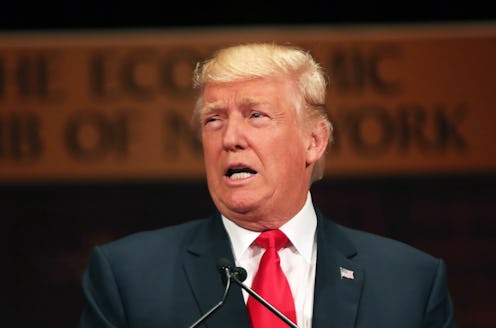News
Trump's Proposal To Eliminate The FDA Scares Me
In a fact sheet released by his campaign Thursday, Republican nominee Donald Trump announced his latest, scariest policy proposal should he be elected president: calling for an elimination of “specific regulations,” including what he referred to as “the FDA Food Police.” Outlining the newest version of his tax plan at the Economic Club of New York on Thursday, Trump’s campaign released the accompanying fact sheet that called for, among other things, getting rid of environmental and food safety regulations, for a savings of almost $1 trillion. The campaign specifically called out regulations on “food production hygiene, food packaging, [and] food temperatures.”
Is it just me, or are other people having flashbacks to Soylent Green?
The real-estate-mogul-turned-reality-TV-star-turned-politician has previously made known his contempt for federal regulations, especially ones that conflict with his avowed disbelief in climate change (He once tweeted "the concept of global warming was created by and for the Chinese in order to make U.S. manufacturing non-competitive.") However, it’s possible that this proposal might be the scariest roll back yet, if only because the penalties of ignoring climate change are mostly slow and incremental. Meanwhile, we interact with food everyday.
The axiom that all regulations are always bad all the time is a favorite line of some conservative pundits, but doesn’t enjoy the same popularity with economists. Still, the idea that the only thing standing between citizens and success is the government is one that has been a refrain of conservative politics over half a century.
What makes Trump’s proposed regulatory rollbacks so scary is that the dangers of an unregulated factory farming industry are not hard to imagine. As author and co-producer Michael Pollan said in the documentary Food Inc., “The way we eat has changed more in the last 50 years than in the previous 10,000. But the image that's used to sell the food, it is still the imagery of agrarian America.”
Pol;an's co-producer, author Eric Schlosser, went on to say, “There is this deliberate veil… that's dropped between us and where our food is coming from. The industry doesn't want you to know the truth about what you're eating, because if you knew, you might not want to eat it.”
In free-market society, companies are incentivized to find the cheapest way of producing their product, and if they can find ways to hide less-than-savory practices that might otherwise hurt them in the marketplace, chances are they’ll do it. As Nobel Prize-winning economist Joseph Stiglitz put it: “Markets are at the center of every successful economy. But unfettered markets often do not serve society well. Over the past two hundred years, economic theory and historical experience has shown that financial markets often fail to perform their essential functions of managing risk and allocating capital well, with disastrous social and economic consequences.” In a nutshell, that's why we need food safety regulations.
We may not always be aware of it, but we rely on government regulations to ensure safety in our food to a great extent — from expiration dates on products to accurate ingredient counts, to even the basic trust we put in companies to run clean, hygienic facilities. That this regulation roll back would appeal to anyone is kind of shocking.
Then again, perhaps the kind of man who thinks a Trump Tower Taco Bowl is a sufficient way to celebrate Cinco de Mayo wouldn't show the best judgment about food consumption.
